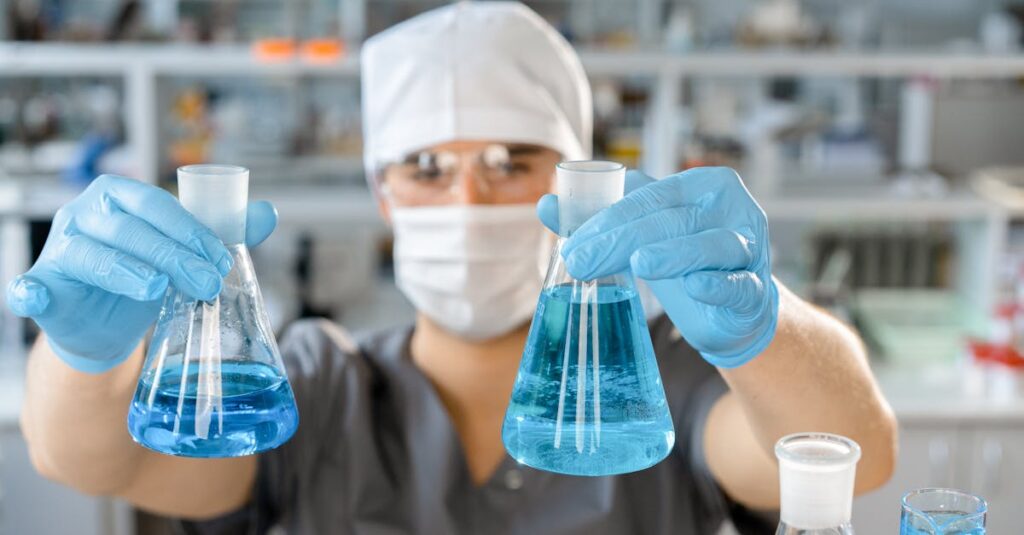
Program Overview
Program Duration: 2 Years (4 Semesters) Qualification Level: Diploma
The Diploma in Chemical Engineering at Summit Heights Institute is a rigorous and forward-looking program designed to equip students with the fundamental principles and advanced practical skills required by the modern chemical and process industries. This curriculum is meticulously crafted to address current market demands and global industry trends, focusing on process design and optimization, sustainable engineering, digitalization, advanced materials, and bioprocess technologies. Graduates will be prepared for diverse technical roles in manufacturing, energy, pharmaceuticals, environmental management, food processing, and materials science.
Key Program Pillars
- Core Chemical Engineering Fundamentals: Strong theoretical foundation in thermodynamics, fluid mechanics, heat and mass transfer, and reaction engineering.
- Process Design & Optimization: Practical skills in designing, analyzing, and optimizing chemical processes for efficiency and sustainability.
- Sustainable & Green Engineering: Emphasis on environmentally conscious design, resource efficiency, and renewable energy integration.
- Digitalization & Data Analytics: Proficiency in process simulation, data analysis, and automation tools relevant to chemical plants.
- Safety & Risk Management: Comprehensive understanding of process safety, hazard identification, and risk mitigation.
- Industry-Relevant Applications: Exposure to diverse sectors including pharmaceuticals, food, advanced materials, and biotechnology.
- Problem-Solving & Innovation: Developing critical thinking and practical application skills through laboratory work and project-based learning.
Learning Outcomes
Upon successful completion of this Diploma, graduates will be able to:
- Apply fundamental principles of chemistry, physics, and mathematics to analyze and solve chemical engineering problems.
- Design, analyze, and optimize chemical processes and unit operations, considering technical, economic, and environmental factors.
- Understand and apply principles of thermodynamics, fluid mechanics, heat transfer, mass transfer, and chemical reaction engineering.
- Utilize process simulation software and data analysis techniques for process development and improvement.
- Implement and manage process control systems and instrumentation in chemical plants.
- Identify and mitigate hazards, ensuring process safety and environmental compliance.
- Propose and evaluate sustainable and green engineering solutions for industrial processes.
- Understand the properties and applications of various engineering materials, including advanced materials.
- Communicate technical information effectively, both verbally and in writing, and collaborate effectively in multidisciplinary teams.
- Contribute to the design, operation, and troubleshooting of chemical and biochemical processes in various industries.
Curriculum Structure
Year 1: Foundational Sciences & Core Principles
Semester 1
- CHE101: General Chemistry for Engineers
- Description: Covers fundamental chemical principles, including atomic structure, chemical bonding, stoichiometry, states of matter, solutions, chemical reactions, and basic organic chemistry relevant to engineering.
- Learning Outcomes: Apply chemical principles to engineering contexts; balance chemical equations; understand basic chemical reactions and properties of matter.
- CHE102: Engineering Mathematics I
- Description: Focuses on essential mathematical concepts for engineering, including algebra, trigonometry, functions, vectors, complex numbers, and an introduction to differential and integral calculus.
- Learning Outcomes: Solve engineering-related mathematical problems; apply calculus to simple chemical engineering contexts.
- CHE103: Engineering Physics
- Description: Explores fundamental physics principles relevant to chemical engineering, including mechanics, thermodynamics, fluid properties, and an introduction to electricity and magnetism.
- Learning Outcomes: Explain basic physical phenomena; apply physics principles to engineering problems; understand the relationship between physical laws and chemical processes.
- CHE104: Introduction to Chemical Engineering & Ethics
- Description: Provides an overview of the chemical engineering discipline, its history, role in various industries, and ethical responsibilities. Introduces fundamental concepts like material and energy balances.
- Learning Outcomes: Define chemical engineering; understand its industrial applications; perform basic material and energy balances; recognize ethical considerations in engineering.
- CHE105: Engineering Graphics & CAD Fundamentals
- Description: Develops skills in technical drawing, schematic representation, and an introduction to Computer-Aided Design (CAD) software for process flow diagrams (PFDs) and piping and instrumentation diagrams (P&IDs).
- Learning Outcomes: Create technical drawings and schematics; use CAD software for basic process diagrams.
Semester 2
- CHE106: Organic & Physical Chemistry for Engineers
- Description: Builds on general chemistry, covering key concepts in organic chemistry (functional groups, reactions) and physical chemistry (kinetics, equilibria, electrochemistry) with applications in chemical processes.
- Learning Outcomes: Understand fundamental organic reactions; apply principles of chemical kinetics and equilibria; explain basic electrochemistry.
- CHE107: Engineering Mathematics II
- Description: Continues with advanced calculus topics including differential equations, linear algebra, and an introduction to numerical methods, with applications to chemical engineering problems.
- Learning Outcomes: Solve differential equations relevant to chemical processes; apply linear algebra to system analysis; use numerical methods for problem-solving.
- CHE108: Chemical Engineering Thermodynamics I
- Description: Introduces fundamental concepts of thermodynamics, including properties of pure substances, ideal and real gases, phase equilibria, and the First and Second Laws of Thermodynamics.
- Learning Outcomes: Apply the laws of thermodynamics to chemical systems; analyze phase behavior; calculate energy changes in processes.
- CHE109: Fluid Mechanics for Chemical Engineers
- Description: Covers principles of fluid statics and dynamics, including fluid properties, manometry, Bernoulli’s equation, pipe flow, pumps, and fluid flow measurement.
- Learning Outcomes: Analyze fluid flow in process equipment; calculate pressure drops and flow rates; select appropriate pumps.
- CHE110: Introduction to Programming & Data Analysis for Chemical Engineers
- Description: Teaches fundamental programming concepts (e.g., Python, MATLAB) for solving chemical engineering problems, data manipulation, visualization, and an introduction to statistical analysis of process data.
- Learning Outcomes: Write basic programs for engineering calculations; perform simple data analysis; visualize process data.
Year 2: Core Operations, Design & Modern Applications
Semester 3
- CHE201: Chemical Engineering Thermodynamics II
- Description: Builds on Thermodynamics I, focusing on solution thermodynamics, chemical reaction equilibria, and advanced thermodynamic cycles and their application in process design.
- Learning Outcomes: Analyze chemical reaction equilibria; apply solution thermodynamics to mixtures; evaluate energy efficiency of processes.
- CHE202: Heat Transfer
- Description: Covers the principles of heat transfer by conduction, convection, and radiation. Focuses on the design and analysis of heat exchangers, evaporators, and other heat transfer equipment.
- Learning Outcomes: Calculate heat transfer rates; design and analyze heat exchangers; understand heat transfer in industrial equipment.
- CHE203: Mass Transfer I
- Description: Introduces the fundamental principles of mass transfer, including diffusion, convection, and interfacial mass transfer. Covers applications in gas absorption, stripping, and humidification.
- Learning Outcomes: Apply mass transfer principles to separation processes; analyze mass transfer in various unit operations.
- CHE204: Chemical Reaction Engineering I
- Description: Covers reaction kinetics, reactor design principles for ideal batch, plug flow, and continuous stirred-tank reactors (CSTRs), and the effect of temperature and pressure on reaction rates.
- Learning Outcomes: Analyze reaction kinetics; design ideal chemical reactors; predict reactor performance.
- CHE205: Process Instrumentation & Control
- Description: Introduces various process sensors and transducers, control valves, and the fundamentals of feedback control systems (PID controllers). Covers basic control loop design and tuning.
- Learning Outcomes: Identify common process instruments; understand feedback control principles; tune PID controllers for process stability.
- CHE206: Process Safety & Risk Management
- Description: Emphasizes hazard identification, risk assessment, and mitigation strategies in chemical plants. Covers topics like HAZOP studies, LOPA, inherent safety, and emergency response planning.
- Learning Outcomes: Identify process hazards; conduct basic risk assessments; understand safety regulations and standards; develop emergency plans.
Semester 4
- CHE207: Mass Transfer II & Separation Processes
- Description: Continues with advanced mass transfer operations, including distillation, liquid-liquid extraction, adsorption, and membrane separation processes. Focuses on design and optimization of these unit operations.
- Learning Outcomes: Design and analyze various separation processes; optimize separation efficiency; understand advanced mass transfer applications.
- CHE208: Chemical Reaction Engineering II & Bioprocesses
- Description: Extends Reaction Engineering I to non-ideal reactors, heterogeneous catalysis, and an introduction to biochemical reactions and bioreactor design for biotechnological applications.
- Learning Outcomes: Analyze non-ideal reactors; understand catalytic reactions; describe basic bioprocess principles and bioreactor design.
- CHE209: Chemical Process Design & Optimization
- Description: Integrates knowledge from previous modules into comprehensive chemical plant design. Covers process synthesis, flowsheet development, equipment sizing, economic evaluation, and process optimization techniques.
- Learning Outcomes: Develop process flow diagrams; size major process equipment; perform economic analysis of chemical plants; apply optimization methods.
- CHE210: Sustainable Chemical Engineering & Green Chemistry
- Description: Focuses on principles of green chemistry and sustainable process design, including atom economy, waste minimization, renewable feedstocks, energy efficiency, and environmental impact assessment of chemical processes.
- Learning Outcomes: Apply green chemistry principles; design processes with reduced environmental impact; evaluate sustainability metrics.
- CHE211: Advanced Materials in Chemical Engineering
- Description: Explores the properties, synthesis, and applications of advanced materials relevant to chemical engineering, such as polymers, composites, nanomaterials, and smart materials, for various industrial uses.
- Learning Outcomes: Understand the properties of advanced materials; identify their applications in chemical processes; select materials for specific engineering challenges.
- CHE212: Chemical Engineering Capstone Project
- Description: A culminating project where students apply integrated chemical engineering knowledge and skills to a real-world industrial problem or a design challenge. This involves research, process simulation, design, economic analysis, and a comprehensive report and presentation.
- Learning Outcomes: Execute a comprehensive chemical engineering project; apply critical thinking to complex problems; utilize simulation tools for design; present technical findings professionally.
